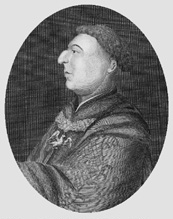The Good, the Bad and the Unready (39 page)
Read The Good, the Bad and the Unready Online
Authors: Robert Easton

 Suleiman the
Suleiman the
Lawgiver
see
Suleiman the
MAGNIFICENT
 John with the
John with the
Leaden Sword
John, duke of Bedford, 1389–1435

John with the
Leaden Sword
During the Hundred Years War Archibald the
LOSER
taunted John, the regent for Henry the
MARTYR
of England, with this nickname. Archibald was feeling confident after winning a couple of morale-boosting, if militarily insignificant, skirmishes, and mocked John for possessing a ‘leaden sword’, a term suggesting incompetence in the field. In response John invited Archibald ‘to dine with him at Verneuil’ and in the ensuing battle the nickname lost its validity and Archibald his life.
 Alfonso the
Alfonso the
Learned
see
Alfonso the
ASTRONOMER
 Frederick the
Frederick the
Learned
see
Frederick the
WISE
 Baldwin the
Baldwin the
Leper
Baldwin IV, king of Jerusalem, 1161–85
For a king to continue ruling when crippled by a debilitating disease, two things are essential: an indomitable spirit and the devotion of his subjects. Baldwin had both in spades. William of Tyre, Baldwin’s tutor, writes of his first suspicions that his charge had leprosy when he noticed the prince’s failure even to flinch when pinched by his playmates. And leprosy was a very public disease. ‘It grew more serious each day,’ remarks William, ‘specially injuring his hands and feet and face so that his subjects were distressed whenever they looked at him.’ Despite his condition, however, Baldwin became not only king but also perhaps the greatest warrior of the age, inspiring his troops to frustrate the dynastic ambitions of Saladin the
CHIVALROUS SARACEN
.
Baldwin rode at the vanguard of his army, even though he could not remount should he be unsaddled, and he continued to lead his men even when failing sight and the inability to use his arms and legs meant that he had to be carried in a litter slung between two horses. In 1182 he wrote a heartfelt letter to Louis VII (‘Louis the Young’) of France, humbly recognizing his limitations and offering to abdicate in favour of a healthier man. ‘It is not fitting,’ he conceded, ‘that a hand so weak as mine should hold power when fear of Arab aggression daily presses upon the Holy City and when my sickness increases the enemy’s daring.’ A replacement failed to arrive, however, and so, aware of his imminent death, he crowned his eight-year-old nephew king. Even though defeat was guaranteed, Baldwin died adored by those he served.
 Henry the
Henry the
Liberal
Henry I, count of Champagne, 1152–81
Henry’s brothers must have been shocked and delighted when, after their father’s death, he plumped for the province of Champagne as his inheritance rather than wealthier territories such as Chartres or Blois. But Henry, son-in-law of ‘Louis the Foolish’,
was himself no fool. Recognizing the province’s growth potential, he instituted a set calendar for six massive trade fairs and guaranteed the security of all who visited; in so doing, he transformed Champagne into the undisputed commercial centre of Western Europe. The province, and in particular its count, became very rich.
Being a devout Christian, Henry wanted to share his good fortune. So he set about endowing local abbeys and monasteries with land and privileges and, in gratitude, the amazed and delighted monks and abbots were the first to give him his nickname.
 Sigismund the
Sigismund the
Light of the World
Sigismund, Holy Roman Emperor, 1368–1437
Sigismund won his grand nickname among chroniclers for his high intelligence, winning demeanour and ability to speak at least six languages, but he died having contributed little to the betterment of his empire or Europe as a whole. One of the main factors behind the dimness of ‘the Light of the World’ appears to have been his chronic indecision, as demonstrated by his dealings with his half-brother Wenceslas the
WORTHLESS
of Bohemia.
While king of Hungary and margrave of Brandenburg, Sigismund looked to expand his territories, and debated whether to invade Wenceslas’s kingdom. At first he decided not to, and allied himself to Wenceslas, who was at war with most of Bohemia’s nobility. But he then threw his support behind the nobles, only to change allegiance again and again until he finally plumped for Wenceslas, whom he then imprisoned and then released again.
On Wenceslas’s death, Sigismund inherited the Bohemian crown and undertook a series of wars against John Hus and his followers, but was unable to win a single battle of significance. The Hussites, meanwhile, referred to him as ‘the Red Demon’ alluding, in part, to the colour of his beard.
 Lightning
Lightning
see
Bejazet the
THUNDERBOLT
 Louis the
Louis the
Lion